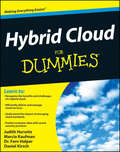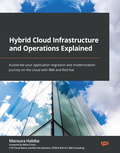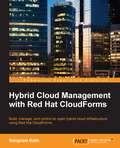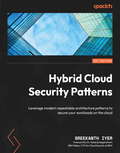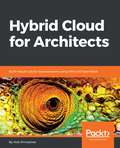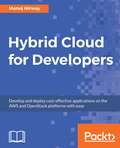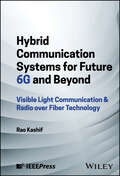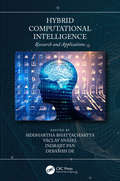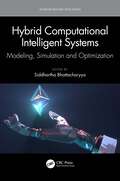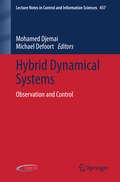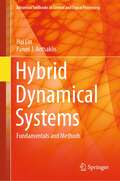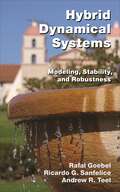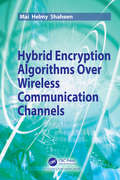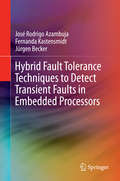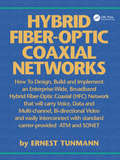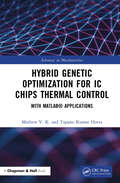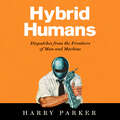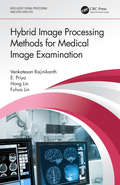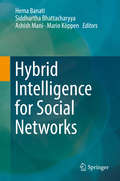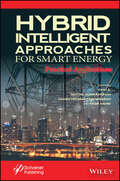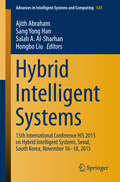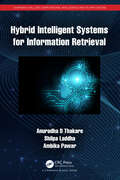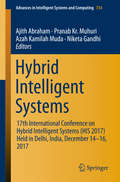- Table View
- List View
Hybrid Cloud For Dummies
by Marcia Kaufman Fern Halper Hurwitz Dan KirschChoose the right combination of public, private, and data center resources to empower your businessHybrid clouds are transforming the way that organizations do business. This handy guide helps you find out what this new cloud deployment model is all about. You'll get down- to-earth information about cloud technology, questions to consider, and how to plan and deliver your move to a hybrid environment.Constructing the cloud -- learn the basic concepts of the hybrid cloud from both a technical and business perspectiveDelivering cloud services -- dive deeper into the actual foundational elements of the hybrid cloudIdentifying business value -- determine your hybrid cloud needs based on your business objectivesUnified hybrid environments -- find out what it means to create a computing environment that brings elements of the data center together with public and private cloud servicesMaking it work -- examine the steps you need to take to make this new architectural approach work -- including security, governance, data, integration, monitoring, and moreGet your ticket to the cloud -- tips on how to talk to cloud providers and plan for the service you chooseOpen the book and find:Different cloud deployment models and what differentiates a hybrid cloud from other cloud modelsThe impact of the hybrid cloud on cloud delivery modelsWhy service orientation matters in a hybrid cloudWays to develop and deploy applications in a hybrid worldGuidance in finding the right hybrid cloud service providersSecurity and governance in a hybrid modelThe role of workload optimization in hybrid environmentsLearn to:Recognize the benefits and challenges of a hybrid cloudEfficiently deliver and manage cloud servicesUnderstand the impact of emerging cloud standardsProtect customer data with sound security practices
Hybrid Cloud Infrastructure and Operations Explained: Accelerate your application migration and modernization journey on the cloud with IBM and Red Hat
by Mansura Habiba Mihai CrivetiModernize and migrate smoothly to hybrid cloud infrastructure and successfully mitigate complexities relating to the infrastructure, platform, and production environmentKey FeaturesPresents problems and solutions for application modernization based on real-life use casesHelps design and implement efficient, highly available, and scalable cloud-native applicationsTeaches you how to adopt a cloud-native culture for successful deployments on hybrid cloud platformsBook DescriptionMost organizations are now either moving to the cloud through modernization or building their apps in the cloud. Hybrid cloud is one of the best approaches for cloud migration and the modernization journey for any enterprise. This is why, along with coding skills, developers need to know the big picture of cloud footprint and be aware of the integration models between apps in a hybrid and multi-cloud infrastructure. This book represents an overview of your end-to-end journey to the cloud. To be future agnostic, the journey starts with a hybrid cloud.You'll gain an overall understanding of how to approach migration to the cloud using hybrid cloud technologies from IBM and Red Hat. Next, you'll be able to explore the challenges, requirements (both functional and non-functional), and the process of app modernization for enterprises by analyzing various use cases. The book then provides you with insights into the different reference solutions for app modernization on the cloud, which will help you to learn how to design and implement patterns and best practices in your job.By the end of this book, you'll be able to successfully modernize applications and cloud infrastructure in hyperscaler public clouds such as IBM and hybrid clouds using Red Hat technologies as well as develop secure applications for cloud environments.What you will learnStrategize application modernization, from the planning to the implementation phaseApply cloud-native development concepts, methods, and best practicesSelect the right strategy for cloud adoption and modernizationExplore container platforms, storage, network, security, and operationsManage cloud operations using SREs, FinOps, and MLOps principlesDesign a modern data insight hub on the cloudWho this book is forThis book is for cloud-native application developers involved in modernizing legacy applications by refactoring and rebuilding them. Cloud solution architects and technical leaders will also find this book useful. It will be helpful to have a basic understanding of cloud-native application development and cloud providers before getting started with this book.
Hybrid Cloud Management with Red Hat CloudForms
by Sangram RathBuild, manage, and control an open hybrid cloud infrastructure using Red Hat CloudForms About This Book * Understand the infrastructure management capabilities through monitoring and tracking techniques * Control the hybrid cloud infrastructure using policies and define actions based on events and conditions * Learn to view and use trends in the hybrid setup to perform capacity planning and optimization Who This Book Is For If you are an existing Red Hat administrator who is new to Red Hat Cloud Infrastructure and would like to manage and deploy Hybrid clouds, then this book is for you. Red Hat Linux administration experience is assumed. What You Will Learn * Install and configure Red Hat CloudForms 3.1 in the Red Hat Enterprise Linux OpenStack platform * Add Amazon EC2 and OpenStack as Cloud providers and adding VMware as an infrastructure provider * Provision an EC2 instance * Manage lifecycle of virtual machines and instances * Create custom domains, namespaces, classes, schemas, instances, and invoke automation workflows * Monitor and gather intelligence information about the Hybrid Cloud environment * Get to know about supported APIs that can be used to integrate third-party systems with Red Hat CloudForms In Detail The increasing adoption of the Cloud has led to enterprises having a heterogeneous IT environment that consists of both private and public cloud infrastructures, and in most cases existing virtualized infrastructures as well. As building and managing such a diverse IT infrastructure is a major challenges, Red Hat CloudForms provides a unified, consistent, and comprehensive management platform. With features like cloud intelligence dashboard, self-service portal, lifecycle management, policy-based governance, quotas, capacity management, monitoring and reporting, Red Hat CloudForms lets you manage your hybrid cloud infrastructure from a single pane of glass. This book will equip you with a hands-on approach on how to build a hybrid cloud environment and then manage, control, and gain operational insights into it. The book starts by showing you how to install and configure Red Hat CloudForms, and add infrastructure and cloud providers to build the hybrid cloud environment. Next, you will learn to provision virtual machines and instances to these platform providers, and manage and control the lifecycle of these resources. You will also get to know about automating provisioning. Moving on, you'll get to grips with the management of resources using policies, events, conditions, and actions. You'll also learn to monitor these resources from a single pane of glass. Finally, the book covers viewing capacity and utilization trends to optimize the overall hybrid cloud infrastructure, and also introduces you to supported APIs. By end of the book, you will be able to deploy and use Red Hat CloudForms. Style and approach This book is an easy-to-follow guide that explains all topics in a sequential manner, building upon each other to finally create and manage the Hybrid Cloud environment.
Hybrid Cloud Security Patterns: Leverage modern repeatable architecture patterns to secure your workloads on the cloud
by Sreekanth Iyer Dr. Nataraj NagaratnamUnderstand unique security patterns related to identity and access management, infrastructure, data and workload protection, compliance and posture management, and zero trust for your hybrid cloud deploymentsKey FeaturesSecure cloud infrastructure, applications, data, and shift left security to create DevSecOpsExplore patterns for continuous security, automated threat detection and accelerated incident responseLeverage hybrid cloud security patterns for protecting critical data using a zero trust modelPurchase of the print or Kindle book includes a free eBook in the PDF formatBook DescriptionSecurity is a primary concern for enterprises going through digital transformation and accelerating their journey to multi-cloud environments. This book recommends a simple pattern-based approach to architecting, designing and implementing security for workloads deployed on AWS, Microsoft Azure, Google Cloud, and IBM Cloud.The book discusses enterprise modernization trends and related security opportunities and challenges. You'll understand how to implement identity and access management for your cloud resources and applications. Later chapters discuss patterns to protect cloud infrastructure (compute, storage and network) and provide protection for data at rest, in transit and in use. You'll also learn how to shift left and include security in the early stages of application development to adopt DevSecOps. The book also deep dives into threat monitoring, configuration and vulnerability management, and automated incident response. Finally, you'll discover patterns to implement security posture management backed with intelligence and automated protection to stay ahead of threats.By the end of this book, you'll have learned all the hybrid cloud security patterns and be able to use them to create zero trust architecture that provides continuous security and compliance for your cloud workloads.What you will learnAddress hybrid cloud security challenges with a pattern-based approachManage identity and access for users, services, and applicationsUse patterns for secure compute, network isolation, protection, and connectivityProtect data at rest, in transit and in use with data security patternsUnderstand how to shift left security for applications with DevSecOpsManage security posture centrally with CSPMAutomate incident response with SOARUse hybrid cloud security patterns to build a zero trust security modelWho this book is forThe book is for cloud solution architects, security professionals, cloud engineers, and DevOps engineers, providing prescriptive guidance on architecture and design patterns for protecting their data and securing applications deployed on hybrid cloud environments. Basic knowledge of different types of cloud providers, cloud deployment models, and cloud consumption models is expected.
Hybrid Cloud for Architects: Build robust hybrid cloud solutions using AWS and OpenStack
by David Duncan Alok ShrivastwaBuild your own hybrid cloud strategy with this comprehensive learning guide. Key Features Build a hybrid cloud strategy for your organization with AWS and OpenStack Leverage Hybrid Cloud to design a complex deployment pipeline Learn to implement security and monitoring best practices with real-world examples Book Description Hybrid cloud is currently the buzz word in the cloud world. Organizations are planning to adopt hybrid cloud strategy due to its advantages such as untested workloads, cloud-bursting, cloud service brokering and so on. This book will help you understand the dynamics, design principles, and deployment strategies of a Hybrid Cloud. You will start by understanding the concepts of hybrid cloud and the problems it solves as compared to a stand-alone public and private cloud. You will be delving into the different architecture and design of hybrid cloud. The book will then cover advanced concepts such as building a deployment pipeline, containerization strategy, and data storage mechanism. Next up, you will be able to deploy an external CMP to run a Hybrid cloud and integrate it with your OpenStack and AWS environments. You will also understand the strategy for designing a Hybrid Cloud using containerization and work with pre-built solutions like vCloud Air, VMware for AWS, and Azure Stack. Finally, the book will cover security and monitoring related best practices that will help you secure your cloud infrastructure. By the end of the book, you will be in a position to build a hybrid cloud strategy for your organization. What you will learn Learn the demographics and definitions of Hybrid Cloud Understand the different architecture and design of Hybrid Cloud Explore multi-cloud strategy and use it with your hybrid cloud Implement a Hybrid Cloud using CMP / Common API’s Implement a Hybrid Cloud using Containers Overcome various challenges and issues while working with your Hybrid Cloud Understand how to monitor your Hybrid Cloud Discover the security implications in the Hybrid CloudWho this book is for This book is targeted at cloud architects, cloud solution providers, DevOps engineers, or any working stakeholder who wants to learn about the hybrid cloud architecture. A basic understanding of public and private cloud is desirable.
Hybrid Cloud for Developers: Develop and deploy cost-effective applications on the AWS and OpenStack platforms with ease
by Manoj HirwayDevelop and manage applications on the AWS and OpenStack platforms with this comprehensive learning guide.Key FeaturesA step-by-step guide to help you develop applications on the hybrid cloud platform. Acquire an in-depth understanding of the OpenStack and AWS cloud platforms.Extensive source code examples for OpenStack and AWS applications.Easily troubleshoot OpenStack and AWS issues.Understand the best practices and security measures for the hybrid cloud platform.Book DescriptionThis book introduces you to the hybrid cloud platform, and focuses on the AWS public cloud and OpenStack private cloud platforms. It provides a deep dive into the AWS and OpenStack cloud platform services that are essential for developing hybrid cloud applications. You will learn to develop applications on AWS and OpenStack platforms with ease by leveraging various cloud services and taking advantage of PaaS.The book provides you with the ability to leverage the flexibility of choosing a cloud platform for migrating your existing resources to the cloud, as well as developing hybrid cloud applications that can migrate virtual machine instances from AWS to OpenStack and vice versa. You will also be able to build and test cloud applications without worrying about the system that your development environment supports.The book also provides an in-depth understanding of the best practices that are followed across the industry for developing cloud applications, as well as for adapting the hybrid cloud platform. Lastly, it also sheds light on various troubleshooting techniques for OpenStack and AWS cloud platform services that are consumed by hybrid cloud applications.By the end of this book, you will have a deep understanding of the hybrid cloud platform and will be able to develop robust, efficient, modular, scalable, and flexible cloud applications.What you will learn Understand the hybrid cloud platform Explore the AWS and OpenStack cloud platforms in depth Develop AWS applications with source code examples Develop OpenStack applications with source code examples Troubleshoot OpenStack and AWS Learn hybrid cloud best practices Understand security measures on the hybrid cloudWho this book is forIf you are an IT professional, developer, or a DevOps engineer looking to develop and manage your applications on the hybrid cloud platform, then this book is for you. Some prior knowledge of the public and private cloud will enhance your skills. Developers looking to build applications using AWS or OpenStack services will also benefit from this book.
Hybrid Communication Systems for Future 6G and Beyond: Visible Light Communication & Radio over Fiber Technology
by Rao KashifComprehensive guide to hybrid communication systems using visible light communication, radio over fiber, and auto channel switching technologies Hybrid Communication Systems for Future 6G and Beyond explores the future of wireless communication and discusses how we can create more efficient and reliable ways to communicate by unlocking the potential of three specific technologies: visible light communication (VLC), radio over fiber (RoF) technology, and auto channel switching. This book begins by exploring the potential of VLC technology, which is currently considered the best alternative to wireless communication. It then moves on to describe how RoF technology can provide a powerful backhaul solution for VLC. Later chapters cover auto channel switching and how it can facilitate data traffic sharing between WiFi and LiFi technologies. Case studies of successful hybrid communication system implementations are included throughout the text to showcase real-world applications and aid in reader comprehension. Written by a highly qualified author with experience in both academia and industry, Hybrid Communication Systems for Future 6G and Beyond includes information on: The evolution, advantages, and disadvantages of hybrid systems, as well as their current limitations and potential solutions to these limitations RoF modulation techniques, including direct and external modulation, and RoF configuration, including intermediate frequency over fiber, baseband over fiber, and millimeter-wave signal generation RoF system level analysis, covering encoding formats, PIN and APD photodiodes, and various experiments and simulations Hybrid communication technology that incorporates wireless Wi-Fi and Visible Light Communication (VLC) such as Li-Fi, to support the upcoming 6G and beyond high-speed communication networks Hybrid Communication Systems for Future 6G and Beyond is an invaluable resource for students, researchers, and professionals in the fields of telecommunications and electronic networking who are interested in designing and implementing hybrid communication systems.
Hybrid Computational Intelligence: Research and Applications (Studies in Computational Intelligence #611)
by Debashis De Václav Snášel Siddhartha Bhattacharyya Indrajit PanHybrid computational intelligent techniques are efficient in dealing with the real-world problems encountered in engineering fields. The primary objective of this book is to provide an exhaustive introduction as well as review of the hybrid computational intelligent paradigm, with supportive case studies. In addition, it aims to provide a gallery of engineering applications where this computing paradigm can be effectively use. Finally, it focuses on the recent quantum inspired hybrid intelligence to develop intelligent solutions for the future. The book also incorporates video demonstrations of each application for better understanding of the subject matter.
Hybrid Computational Intelligent Systems: Modeling, Simulation and Optimization (Quantum Machine Intelligence)
by Siddhartha BhattacharyyaHybrid Computational Intelligent Systems – Modeling, Simulation and Optimization unearths the latest advances in evolving hybrid intelligent modeling and simulation of human-centric data-intensive applications optimized for real-time use, thereby enabling researchers to come up with novel breakthroughs in this ever-growing field. Salient features include the fundamentals of modeling and simulation with recourse to knowledge-based simulation, interaction paradigms, and human factors, along with the enhancement of the existing state of art in a high-performance computing setup. In addition, this book presents optimization strategies to evolve robust and failsafe intelligent system modeling and simulation. The volume also highlights novel applications for different engineering problems including signal and data processing, speech, image, sensor data processing, innovative intelligent systems, and swarm intelligent manufacturing systems. Features: A self-contained approach to integrating the principles of hybrid computational ntelligence with system modeling and simulation Well-versed foundation of computational intelligence and its application to real life engineering problems Elucidates essential background, concepts, definitions, and theories thereby putting forward a complete treatment on the subject Effective modeling of hybrid intelligent systems forms the backbone of almost every operative system in real-life Proper simulation of real-time hybrid intelligent systems is a prerequisite for deriving any real-life system solution Optimized system modeling and simulation enable real-time and failsafe operations of the existing hybrid intelligent system solutions Information presented in an accessible way for researchers, engineers, developers, and practitioners from academia and industry working in all major areas and interdisciplinary areas of hybrid computational intelligence and communication systems to evolve human-centered modeling and simulations of real-time data-intensive intelligent systems.
Hybrid Dynamical Systems
by Mohamed Djemai Michael DefoortThis book is a collection of contributions defining the state of current knowledge and new trends in hybrid systems - systems involving both continuous dynamics and discrete events - as described by the work of several well-known groups of researchers. Hybrid Dynamical Systems presents theoretical advances in such areas as diagnosability, observability and stabilization for various classes of system. Continuous and discrete state estimation and self-triggering control of nonlinear systems are advanced. The text employs various methods, among them, high-order sliding modes, Takagi-Sugeno representation and sampled-data switching to achieve its ends. The many applications of hybrid systems from power converters to computer science are not forgotten; studies of flexible-joint robotic arms and - as representative biological systems - the behaviour of the human heart and vasculature, demonstrate the wide-ranging practical significance of control in hybrid systems. The cross-disciplinary origins of study in hybrid systems are evident. Academic researchers and graduate students interested in hybrid and switched systems need look no further than Hybrid Dynamical Systems for a single source which will bring them up to date with work in this area from around the world.
Hybrid Dynamical Systems: Fundamentals and Methods (Advanced Textbooks in Control and Signal Processing)
by Hai Lin Panos J. AntsaklisA graduate-level textbook, Hybrid Dynamical Systems provides an accessible and comprehensive introduction to the theory of hybrid systems. It emphasizes results that are central to a good understanding of the importance and role of such systems. The authors have developed the materials in this book while teaching courses on hybrid systems, cyber-physical systems, and formal methods.This textbook helps students to become familiar with both the major approaches coloring the study of hybrid dynamical systems. The computer science and control systems points of view – emphasizing discrete dynamics and real time, and continuous dynamics with switching, respectively – are each covered in detail.The book shows how the behavior of a system with tightly coupled cyber- (discrete) and physical (continuous) elements can best be understood by a model simultaneously encompassing all the dynamics and their interconnections. The theory presented is of fundamental importance in a wide range of emerging fields from next-generation transportation systems to smart manufacturing.Features of the text include:extensive use of examples to illustrate the main concepts and to provide insights additional to those acquired from the main text;chapter summaries enabling students to assess their progress;end-of-chapter exercises, which test learning as a course proceeds;an instructor’s guide showing how different parts of the book can be exploited for different course requirements; anda solutions manual, freely available for download by instructors adopting the book for their teaching.Access to MATLAB and Stateflow is not required but would be beneficial, especially for exercises in which simulations are a key tool.
Hybrid Dynamical Systems: Modeling, Stability, and Robustness
by Andrew R. Teel Rafal Goebel Ricardo G. SanfeliceHybrid dynamical systems exhibit continuous and instantaneous changes, having features of continuous-time and discrete-time dynamical systems. Filled with a wealth of examples to illustrate concepts, this book presents a complete theory of robust asymptotic stability for hybrid dynamical systems that is applicable to the design of hybrid control algorithms--algorithms that feature logic, timers, or combinations of digital and analog components. With the tools of modern mathematical analysis, Hybrid Dynamical Systems unifies and generalizes earlier developments in continuous-time and discrete-time nonlinear systems. It presents hybrid system versions of the necessary and sufficient Lyapunov conditions for asymptotic stability, invariance principles, and approximation techniques, and examines the robustness of asymptotic stability, motivated by the goal of designing robust hybrid control algorithms. This self-contained and classroom-tested book requires standard background in mathematical analysis and differential equations or nonlinear systems. It will interest graduate students in engineering as well as students and researchers in control, computer science, and mathematics.
Hybrid Encryption Algorithms over Wireless Communication Channels
by Mai Helmy ShaheenThis book presents novel hybrid encryption algorithms that possess many different characteristics. In particular, “Hybrid Encryption Algorithms over Wireless Communication Channels”, examines encrypted image and video data for the purpose of secure wireless communications. A study of two different families of encryption schemes are introduced: namely, permutation-based and diffusion-based schemes. The objective of the book is to help the reader selecting the best suited scheme for the transmission of encrypted images and videos over wireless communications channels, with the aid of encryption and decryption quality metrics. This is achieved by applying number-theory based encryption algorithms, such as chaotic theory with different modes of operations, the Advanced Encryption Standard (AES), and the RC6 in a pre-processing step in order to achieve the required permutation and diffusion. The Rubik’s cube is used afterwards in order to maximize the number of permutations. Transmission of images and videos is vital in today’s communications systems. Hence, an effective encryption and modulation schemes are a must. The author adopts Orthogonal Frequency Division Multiplexing (OFDM), as the multicarrier transmission choice for wideband communications. For completeness, the author addresses the sensitivity of the encrypted data to the wireless channel impairments, and the effect of channel equalization on the received images and videos quality. Complete simulation experiments with MATLAB® codes are included. The book will help the reader obtain the required understanding for selecting the suitable encryption method that best fulfills the application requirements.
Hybrid Fault Tolerance Techniques to Detect Transient Faults in Embedded Processors
by Jürgen Becker José Rodrigo Azambuja Fernanda KastensmidtThis book describes fault tolerance techniques based on software and hardware to create hybrid techniques. They are able to reduce overall performance degradation and increase error detection when associated with applications implemented in embedded processors. Coverage begins with an extensive discussion of the current state-of-the-art in fault tolerance techniques The authors then discuss the best trade-off between software-based and hardware-based techniques and introduce novel hybrid techniques. Proposed techniques increase existing fault detection rates up to 100%, while maintaining low performance overheads in area and application execution time.
Hybrid Fiber-Optic Coaxial Networks: How to Design, Build, and Implement an Enterprise-Wide Broadband HFC Network
by Ernest TunmannThis book covers the planning, design and implementation of hybrid fiber-optic coaxial (HFC) broadband networks in schools, universities, hospitals, factories and offices, whether they are in a single building or multiple campuses. Within the next few yea
Hybrid Genetic Optimization for IC Chips Thermal Control: With MATLAB® Applications (Advances in Metaheuristics)
by Mathew V. K. Tapano Kumar HottaThe continuous miniaturization of integrated circuit (IC) chips and the increase in the sleekness of the design of electronic components have led to the monumental rise of volumetric heat generation in electronic components. Hybrid Genetic Optimization for IC Chips Thermal Control: With MATLAB® Applications focuses on the detailed optimization strategy carried out to enhance the performance (temperature control) of the IC chips oriented at different positions on a switch-mode power supply (SMPS) board and cooled using air under various heat transfer modes. Seven asymmetric protruding IC chips mounted at different positions on an SMPS board are considered in the present study that is supplied with non-uniform heat fluxes. Key Features: Provides guidance on performance enhancement and reliability of IC chips Provides a detailed hybrid optimization strategy for the optimal arrangement of IC chips on a board The MATLAB program for the hybrid optimization strategy along with its stability analysis is carried out in a detailed manner Enables thermal design engineers to identify the positioning of IC chips on the board to increase their reliability and working cycle
Hybrid Humans: Dispatches from the Frontiers of Man and Machine
by Harry Parker"I loved Hybrid Humans. It is modest, wise ... and a way of looking at the future without nostalgia for the past" Jeanette Winterson"Harry Parker has explored the cutting edge of interaction between humanity, computing and AI ... a captivating and cautionary travel guide to a new world" Gavin Francis, author of Adventures in Human BeingIs your mobile phone thinking for you? Do your rely more on Google than your own memory?Harry Parker's life changed overnight, when he lost his legs to an IED in Afghanistan. That took him into an often surprising landscape of a very human kind of hacking, and he wondered, are all humans hybrids?Whether it's putting on contact lenses every day or DIY biohackers tinkering in garages, Parker introduces us to the exhilarating breadth of human invention - and intervention. Grappling with his own new identity and disability, he discovers the latest robotics, tech and implants that might lead us to powerful, liberating possibilities for what a body can be.
Hybrid Image Processing Methods for Medical Image Examination (Intelligent Signal Processing and Data Analysis)
by Hong Lin Venkatesan Rajinikanth E Priya Fuhua LinIn view of better results expected from examination of medical datasets (images) with hybrid (integration of thresholding and segmentation) image processing methods, this work focuses on implementation of possible hybrid image examination techniques for medical images. It describes various image thresholding and segmentation methods which are essential for the development of such a hybrid processing tool. Further, this book presents the essential details, such as test image preparation, implementation of a chosen thresholding operation, evaluation of threshold image, and implementation of segmentation procedure and its evaluation, supported by pertinent case studies. Aimed at researchers/graduate students in the medical image processing domain, image processing, and computer engineering, this book: Provides broad background on various image thresholding and segmentation techniques Discusses information on various assessment metrics and the confusion matrix Proposes integration of the thresholding technique with the bio-inspired algorithms Explores case studies including MRI, CT, dermoscopy, and ultrasound images Includes separate chapters on machine learning and deep learning for medical image processing
Hybrid Intelligence for Social Networks
by Mario Köppen Siddhartha Bhattacharyya Hema Banati Ashish ManiThis book explains aspects of social networks, varying from development and application of new artificial intelligence and computational intelligence techniques for social networks to understanding the impact of social networks. Chapters 1 and 2 deal with the basic strategies towards social networks such as mining text from such networks and applying social network metrics using a hybrid approach; Chaps. 3 to 8 focus on the prime research areas in social networks: community detection, influence maximization and opinion mining. Chapter 9 to 13 concentrate on studying the impact and use of social networks in society, primarily in education, commerce, and crowd sourcing. The contributions provide a multidimensional approach, and the book will serve graduate students and researchers as a reference in computer science, electronics engineering, communications, and information technology.
Hybrid Intelligence: Proceedings of the 4th International Conference on Computational Design and Robotic Fabrication (CDRF 2022) (Computational Design and Robotic Fabrication)
by Philip F. Yuan Chao Yan Hua Chai Keke Li Tongyue SunThis open access book is a compilation of selected papers from DigitalFUTURES 2022—The 4th International Conference on Computational Design and Robotic Fabrication (CDRF 2022). The work focuses on novel techniques for computational design and robotic fabrication. The contents make valuable contributions to academic researchers, designers, and engineers in the industry. As well, readers encounter new ideas about intelligence in architecture.
Hybrid Intelligent Approaches for Smart Energy: Practical Applications (Next Generation Computing and Communication Engineering)
by Sanjeevikumar Padmanaban Yasir Hamid John A. Senthil Kumar MohanHYBRID INTELLIGENT APPROACHES FOR SMART ENERGY Green technologies and cleaner energy are two of the most important topics facing our world today, and the march toward efficient energy systems, smart cities, and other green technologies, has been, and continues to be, a long and intricate one. Books like this one keep the veteran engineer and student, alike, up to date on current trends in the technology and offer a reference for the industry for its practical applications. Energy optimization and consumption prediction are necessary to prevent energy waste, schedule energy usage, and reduce the cost. Today, smart computing technologies are slowly replacing the traditional computational methods in energy optimization, consumption, scheduling, and usage. Smart computing is an important core technology in today’s scientific and engineering environment. Smart computation techniques such as artificial intelligence, machine learning, deep learning and Internet of Things (IoT) are the key role players in emerging technologies across different applications, industries, and other areas. These newer, smart computation techniques are incorporated with traditional computation and scheduling methods to reduce power usage in areas such as distributed environment, healthcare, smart cities, agriculture and various functional areas. The scope of this book is to bridge the gap between traditional power consumption methods and modern consumptions methods using smart computation methods. This book addresses the various limitations, issues and challenges of traditional energy consumption methods and provides solutions for various issues using modern smart computation technologies. These smart technologies play a significant role in power consumption, and they are cheaper compared to traditional technologies. The significant limitations of energy usage and optimizations are rectified using smart computations techniques, and the computation techniques are applied across a wide variety of industries and engineering areas. Valuable as reference for engineers, scientists, students, and other professionals across many areas, this is a must-have for any library.
Hybrid Intelligent Systems
by Ajith Abraham Sang Yong Han Salah A. Al-Sharhan Hongbo LiuThis bookis devoted to the hybridization of intelligent systems which is a promisingresearch field of modern computational intelligence concerned with thedevelopment of the next generation of intelligent systems. This Volume containsthe papers presented in the Fifteenth International conference on HybridIntelligent Systems (HIS 2015) held in Seoul, South Korea during November 16-18, 2015. The 26 papers presented in this Volume were carefully reviewed andselected from 90 paper submissions. The Volume will be a valuable referenceto researchers, students and practitioners in the computational intelligencefield.
Hybrid Intelligent Systems Based on Extensions of Fuzzy Logic, Neural Networks and Metaheuristics (Studies in Computational Intelligence #1096)
by Oscar Castillo Patricia MelinIn this book, recent theoretical developments on fuzzy logic, neural networks and optimization algorithms, as well as their hybrid combinations, are presented. In addition, the above-mentioned methods are presented in application areas such as, intelligent control and robotics, pattern recognition, medical diagnosis, decision-making, time series prediction and optimization of complex problems. The book contains a collection of papers focused on hybrid intelligent systems based on soft computing techniques. There are a group of papers with the main theme of type-1 and type-2 fuzzy logic, which basically consists of papers that propose new concepts and algorithms based on type-1 and type-2 fuzzy logic and their applications. There also a group of papers that offer theoretical concepts and applications of meta-heuristics in different areas. Another group of papers outlines diverse applications of fuzzy logic, neural networks and hybrid intelligent systems in medical problems. There are also some papers that present theory and practice of neural networks in different application areas. In addition, there are papers that offer theory and practice of optimization and evolutionary algorithms in different application areas. Finally, there are a group of papers describing applications of fuzzy logic, neural networks and meta-heuristics in pattern recognition and classification problems.
Hybrid Intelligent Systems for Information Retrieval (Chapman & Hall/CRC Computational Intelligence and Its Applications)
by Ambika Pawar Anuradha D Thakare Shilpa LaddhaHybrid Intelligent Systems for Information Retrieval covers three areas along with the introduction to Intelligent IR, i.e., Optimal Information Retrieval Using Evolutionary Approaches, Semantic Search for Web Information Retrieval, and Natural Language Processing for Information Retrieval. • Talks about the design, implementation, and performance issues of the hybrid intelligent information retrieval system in one book • Gives a clear insight into challenges and issues in designing a hybrid information retrieval system • Includes case studies on structured and unstructured data for hybrid intelligent information retrieval • Provides research directions for the design and development of intelligent search engines This book is aimed primarily at graduates and researchers in the information retrieval domain.
Hybrid Intelligent Systems: 17th International Conference On Hybrid Intelligent Systems (his 2017) Held In Delhi, India, December 14-16 2017 (Advances In Intelligent Systems And Computing #734)
by Ajith Abraham Azah Kamilah Muda Niketa Gandhi Pranab Kr. MuhuriThis book includes recent research on Hybrid Intelligent Systems. It presents 35 selected papers from the 17th edition of the International Conference on Hybrid Intelligent Systems (HIS), which was held in Delhi, India from December 14 to 16, 2017. Reflecting the awareness in the respective academic communities that combined approaches are essential to solving the remaining tough problems in computational intelligence, the HIS is a premier conference focused on the hybridization of intelligent systems. The book offers a valuable reference guide for all researchers, students and practitioners in the fields of Computer Science and Engineering.
